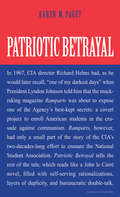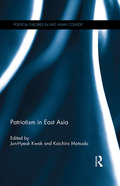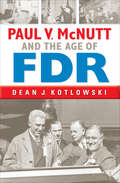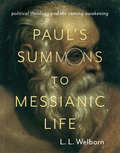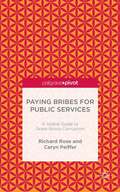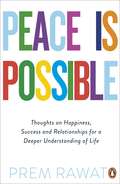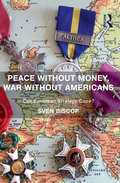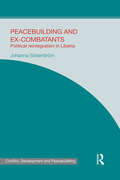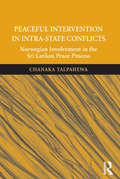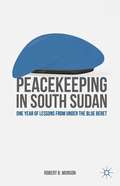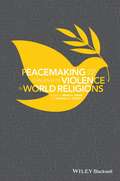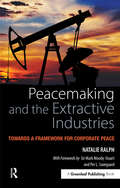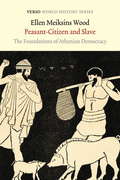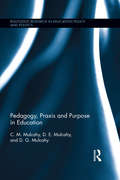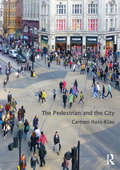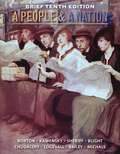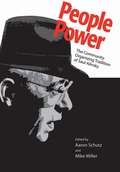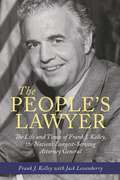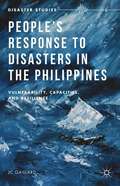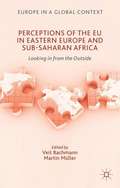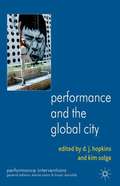- Table View
- List View
Patriotic Betrayal
by Karen M PagetIn this revelatory book, Karen M. Paget shows how the CIA turned the National Student Association into an intelligence asset during the Cold War, with students used--often wittingly and sometimes unwittingly--as undercover agents inside America and abroad. In 1967, Ramparts magazine exposed the story, prompting the Agency into engineering a successful cover-up. Now Paget, drawing on archival sources, declassified documents, and more than 150 interviews, shows that the Ramparts story revealed only a small part of the plot. A cautionary tale, throwing sharp light on the persistent argument, heard even now, about whether America's national-security interests can be advanced by skullduggery and deception, Patriotic Betrayal, says Karl E. Meyer, a former editorial board member of the New York Times and The Washington Post, evokes "the aura of a John le Carré novel with its self-serving rationalizations, its layers of duplicity, and its bureaucratic doubletalk." And Hugh Wilford, author of The Mighty Wurlitzer: How the CIA Played America, calls Patriotic Betrayal "extremely valuable as a case study of relations between the CIA and one of its front groups, greatly extending and enriching our knowledge and understanding of the complex dynamics involved in such covert, state-private relationships; it offers a fascinating portrayal of post-World War II U.S. political culture in microcosm."
Patriotism in East Asia (Political Theories in East Asian Context)
by Jun-Hyeok Kwak Koichiro MatsudaCurrent territorial disputes between the Northeast Asian countries have stimulated a resurgence of bellicose nationalism, and threaten to upset recent efforts to achieve regional cooperation and economic integration in East Asia. Alongside this, debates over pre-1945 Japanese wartime atrocities, aggravated by still unresolved territorial disputes between Japan and its neighbours have triggered diplomatic conflicts in Japanese-South Korean relations, virulent anti-Japanese protests in China, and a dramatic increase of right-wing nationalism in Japan. Many have perceived these phenomena as inevitable corollaries, inasmuch as they regard the Northeast Asian countries as historically homogeneous and nationalistic states, and have begun to question the feasibility of the post-Cold War efforts to replace nationalism with a moderate version of civic solidarity. This book contributes to the debates surrounding patriotism and nationalism in Northeast Asia, and investigates the feasibility of non-ethnocentric patriotism in countries across the region. In doing so, it highlights the differences between Asian and Western concepts of republican patriotism via theoretical discussions of the evolving discourses on nationalism, patriotism, democracy and civic solidarity. The chapters combine theoretical discussion with historical case studies such as modern state building in late Qing Dynasty; nineteenth century Japanese political thought; and the twentieth century Korean independence movement. In turn, the contributors explore the possibilities for republican patriotism in contemporary Northeast Asia, with a focus on the Chinese term minzu, and the possibilities it holds for an alternative configuration of national identity in the age of globalization; Maruyama Masao’s theories of nationalism in Japan; the National Security Law in South Korea, and the impact it has had on the country’s political culture; and the Taiwanese movement for self-governance. Patriotism in East Asia will appeal to students and scholars of Asian politics, political theory, Asian history and peace studies, as well as to those interested in issues of nationalism.
Patronal Politics
by Henry E. HaleThis book proposes a new way of understanding events throughout the world that are usually interpreted as democratization, rising authoritarianism, or revolution. Where the rule of law is weak and corruption pervasive, what may appear to be democratic or authoritarian breakthroughs are often just regular, predictable phases in longer-term cyclic dynamics - patronal politics. This is shown through in-depth narratives of the post-1991 political history of all post-Soviet polities that are not in the European Union. This book also includes chapters on czarist and Soviet history and on global patterns.
Paul V. McNutt and the age of FDR (Encounters)
by Dean J. KotlowskiIn this major biography of an important politician and statesman, Dean Kotlowski presents the life of Paul V. McNutt, a great understudied figure in the era of FDR. McNutt was governor of Indiana, high commissioner to the Philippines (while serving he helped 1,300 Jews flee Nazi Germany for Manila), head of the WWII Federal Security Agency, and would-be presidential candidate. Paul V. McNutt and the Age of FDR explores McNutt's life, his era, and his relationship with Franklin Roosevelt. It sheds light on the expansion of executive power at the state level during the Great Depression, the theory and practice of liberalism as federal administrators understood it in the 1930s and 1940s, the mobilization of the American home front during World War II, and the internal dynamics of the Roosevelt and Truman administrations. McNutt's life underscores the challenges and changes Americans faced during an age of economic depression, global conflict, and decolonialization.
Paul's Political Strategy in 1 Corinthians 1–4 Constitution and Covenant (Society for New Testament Studies Monograph Series)
by Bradley J. BitnerThis volume examines 1 Corinthians 1–4 within first-century politics, demonstrating the significance of Corinth's constitution to the interpretation of Paul's letter. Bradley J. Bitner shows that Paul carefully considered the Roman colonial context of Corinth, which underlay numerous ecclesial conflicts. Roman politics, however, cannot account for the entire shape of Paul's response. Bridging the Hellenism-Judaism divide that has characterized much of Pauline scholarship, Bitner argues that Paul also appropriated Jewish-biblical notions of covenant. Epigraphical and papyrological evidence indicates that his chosen content and manner are best understood with reference to an ecclesial politeia informed by a distinctively Christ-centered political theology. This emerges as a “politics of thanksgiving” in 1 Corinthians 1:4–9 and as a “politics of construction” in 3:5–4:5, where Paul redirects gratitude and glory to God in Christ. This innovative account of Paul's political theology offers fresh insight into his pastoral strategy among nascent Gentile-Jewish assemblies. Is the first study to demonstrate the methodological viability and relevance of Corinth's constitution to the interpretation of 1 Corinthians. Analyses new documentary evidence Incorporates original methodological work and detailed exegesis.
Paul's Summons to Messianic Life: Political Theology and the Coming Awakening (Insurrections: Critical Studies in Religion, Politics, and Culture)
by L. WelbornTaubes, Badiou, Agamben, i ek, Reinhard, and Santner have found in the Apostle Paul's emphasis on neighbor-love a positive paradigm for politics. By thoroughly reexamining Pauline eschatology, L. L. Welborn suggests that neighbor-love depends upon an orientation toward the messianic event, which Paul describes as the "now time" and which he imagines as "awakening." Welborn compares the Pauline dialectic of awakening to attempts by Hellenistic philosophers to rouse their contemporaries from moral lethargy and to the Marxist idea of class consciousness, emphasizing the apostle's radical spirit and moral relevance.
Paying Bribes for Public Services: A Global Guide to Grass-Roots Corruption
by Richard Rose Caryn PeifferThis book documents what happens when people encounter public officials. It draws on multi-national Barometer surveys asking questions about corruption and bribery in 119 countries. Clear prose, tables and figures report the answers given by more than 250,000 people and the conclusion sets out six principles for reducing bribery.
Peace Is Possible: Thoughts on happiness, success and relationships for a deeper understanding of life
by Prem RawatA calming collection of allegories, and illustrations from a world-renowned peace ambassador.Global peace ambassador Prem Rawat has spent his entire life travelling the world to deliver one timeless message: Peace is Possible. Conflict, he explains, takes place at three levels: between countries, between people, and finally within each of us as individuals. These levels are all interconnected. Hence the conflict that rages within a person will lead them to seek out conflict with another. Similarly, conflict between people of one nation is likely to result in conflict between many nations. So the first step to world peace is a simple one: we must first find peace within ourselves. Peace is Possible draws together age-old stories which, as they have been passed down over generations, inspired and transformed the lives of millions. From the power of adaptability, to the importance of trust, to the sticking-place of courage, these are the messages that will change the world. For good.
Peace Without Money, War Without Americans: Can European Strategy Cope?
by Sven BiscopBritain and France were surprised at having to convince the US of the need to intervene in Libya in 2011. The French intervention in Mali in 2013 confirmed the picture; Washington will support European action, but only if and when Europe takes the initiative. Just as the focus of American strategy is shifting to Asia and the Pacific, vital interests in the European neighbourhood require resolute action. Autonomy is being forced upon Europe, but it is an autonomy constrained by a lack of means as, following the financial crisis, defence budgets across the EU member states are slashed. The ramifications of the Arab Spring and the crisis in Ukraine pose challenges of an enormous scale for the EU and its members. Peace Without Money, War Without Americans is the double challenge that European strategy-makers face. What can be expected from strategy at a European level? Can Europe cope?
Peacebuilding and Ex-Combatants: Political Reintegration in Liberia (Studies in Conflict, Development and Peacebuilding)
by Johanna SöderströmThe book examines how ex-combatants in post-war and peacebuilding settings engage in politics, as seen in the case of Liberia. The political mobilization of former combatants after war is often perceived as a threat, ultimately undermining the security and stability of the state. This book questions this simplified view and argues that understanding the political voice of former combatants is imperative. Their post-war role is not black and white; they are not just bad or good citizens, but rather engage in multiple political roles: spoilers, victims, disengaged, beneficiaries, as well as motivated and active citizens. By looking at the political attitudes and values of former combatants, and their understanding of how politics functions, the book sheds new light on the political reintegration of ex-combatants. It argues that political reintegration needs to be given serious attention at the micro-level, but also needs to be scrutinized in two ways: first, through the level of political involvement, which reflects the extent and width of the ex-combatants’ voice. Second, in order to make sense of political reintegration, we also need to uncover what values and norms inform their political involvement. The content of their political voice is captured through a comparison with democratic ideals. Based on interviews with over 100 Liberian ex-combatants, the book highlights that their relationship with politics overall should be characterized as an expression of a 'politics of affection'. This book will be of much interest to students of peacebuilding, African politics, democratization, political sociology, conflict resolution and IR/Security Studies in general.
Peaceful Intervention in Intra-State Conflicts: Norwegian Involvement in the Sri Lankan Peace Process
by Chanaka TalpahewaHave we reached an end to the era of peaceful third party intervention in conflict management and resolution? In the 1990s, with the ending of the Cold War, the intervention of third parties as a non-violent means of negotiating settlements of intra-state conflicts gained prominence but the emphasis in the twenty-first century has been increasingly on military responses. Peaceful Intervention in Intra-State Conflicts: Norwegian Involvement in the Sri Lankan Peace Process is an in-depth, impartial discussion on the background, decision making processes and procedures and related actions in the Norwegian facilitated peace process in Sri Lanka that gradually shifted towards a military solution. It provides the reader with evidence based comprehensive analysis on the attempts of peaceful third party intervention in a complex ethno-separatist intra-state conflict.
Peacekeeping in South Sudan
by Robert B. MunsonA scholarly perspective of a soldier's own challenges working in the United Nations Mission in South Sudan (UNMISS). This work examines how regional/cultural knowledge and language ability contribute to improved leadership in a UN operation, based on the author's own experiences as a staff officer in South Sudan.
Peacemaking and the Challenge of Violence in World Religions
by Michael K. Duffey Irfan A. OmarWritten by top practitioner-scholars who bring a critical yet empathetic eye to the topic, this textbook provides a comprehensive look at peace and violence in seven world religions. Offers a clear and systematic narrative with coverage of Buddhism, Christianity, Confucianism, Hinduism, Islam, Judaism, and Native American religions Introduces a different religion and its sacred texts in each chapter; discusses ideas of peace, war, nonviolence, and permissible violence; recounts historical responses to violence; and highlights individuals within the tradition working toward peace and justice Examines concepts within their religious context for a better understanding of the values, motivations, and ethics involved Includes student-friendly pedagogical features, such as enriching end-of-chapter critiques by practitioners of other traditions, definitions of key terms, discussion questions, and further reading sections.
Peacemaking and the Extractive Industries: Towards a Framework for Corporate Peace
by Natalie RalphPeacemaking and the Extractive Industries addresses a significant gap in research on the political and diplomatic role of multinational corporations in peace processes in intrastate conflict: Corporate Peacemaking. The author focuses on corporations in the oil and mining sectors, supporting or participating in peace negotiations and mediation. The chapters explore national-level peace processes, as well as those at community and global levels. While the focus is on extractive companies, the findings are valuable to companies from all industries looking at peace-related processes. This ground-breaking book gives a comprehensive picture of how Corporate Peacemaking currently works, how it can be developed and implemented, and how it is likely to impact global governance and corporate culture in the future. The book demonstrates that Corporate Peacemaking has the potential to be a powerful element in international governance and peace efforts; and Ralph shows through the business case that companies, as well as communities, will benefit. Ralph presents a new framework for Corporate Peace that will assist companies from all sectors in countries experiencing violent conflict, in addition to instability, human rights abuses and poor governance. Based on rigorous academic research with practical case studies, it is essential reading for practitioners, academics, policy-makers and NGOs.
Peasant-Citizen and Slave
by Ellen Meiksins WoodThe controversial thesis at the center of this study is that, despite the importance of slavery in Athenian society, the most distinctive characteristic of Athenian democracy was the unprecedented prominence it gave to free labor. Wood argues that the emergence of the peasant as citizen, juridically and politically independent, accounts for much that is remarkable in Athenian political institutions and culture. From a survey of historical writings of the eighteenth and nineteenth centuries, the focus of which distorted later debates, Wood goes on to take issue with influential arguments, such as those of G.E.M. de Ste Croix, about the importance of slavery in agricultural production. The social, political and cultural influence of the peasant-citizen is explored in a way which questions some of the most cherished conventions of Marxist and non-Marxist historiography.
Pedagogy, Praxis and Purpose in Education (Routledge Research in Education Policy and Politics)
by C.M. Mulcahy D.E. Mulcahy D.G. MulcahyRecent years have shown the growth of federal legislation and programs having a profound impact on educational policy and practice, and a decline in reliance on broadly based educational justifications. Paralleling this development has been the emergence of well-endowed and influential private foundations, and an increase in corporate influence in shaping policy. In this volume the authors consider the discourse, rhetoric, and underlying values that sustain these developments alongside those that underlie more longstanding and competing educational theories and practices. This volume highlights the importance of recognizing opposing conceptualizations of education—some more educationally productive than others— and their core values, approaches to student learning, strengths and weaknesses, and justification. The authors analyze and critique what Jane Roland Martin has referred to as ‘the deep structure of educational thought’, and seek improved educational policy and practice with particular reference to curriculum and pedagogy. It features a comparative analysis of competing discourses including autocratic control, limited personal development, and praxis.
The Pedestrian and the City
by Carmen Hass-KlauThe Pedestrian and the City provides an overview and insight into the development, politics and policies on walking and pedestrians: it includes the evolution of pedestrian-friendly housing estates in the 19th century up to the present day. Key issues addressed include the struggle of pedestrianization in town centers, the attempts to create independent pedestrian footpaths and the popularity of traffic calming as a powerful policy for reducing pedestrian accidents. Hass-Klau also covers the wider aspects of urban and transport planning, especially public transport, essential for promoting a pedestrian-friendly environment. The book includes pedestrian-friendly policies and guidelines from a number of European countries and includes case studies from the UK, Germany, Britain, France, Spain, Italy, the Netherlands, Denmark, the US and Canada, with further examples from ten additional countries. It also contains a unique collection of original photographs; including ‘before’ and ‘after’ photos of newly introduced pedestrian-friendly transport policies. As the pedestrian environment has become ever more crucial for the future of our cities, the book will be invaluable to students and practicing planners, geographers, transport engineers and local government officers.
A People and A Nation: A History of the United States (Brief Tenth Edition)
by Mary Beth Norton Jane Kamensky Carol Sheriff David W. Blight Beth Bailey Fredrik Logevall Debra Michals Howard P. ChudacoffThe Brief Edition of A PEOPLE AND A NATION offers a succinct and spirited narrative that tells the stories of all people in the United States. The authors' attention to race and racial identity and their inclusion of everyday people and popular culture brings history to life, engaging readers and encouraging them to imagine what life was really like in the past.
People Power: The Community Organizing Tradition of Saul Alinsky
by Aaron Schutz Mike MillerSaul Alinsky, according to Time Magazine in 1970, was a "prophet of power to the people," someone who "has possibly antagonized more people . . . than any other living American." People Power introduces the major organizers who adopted and modified Alinsky's vision across the United States:--Fred Ross, Cesar Chavez, Dolores Huerta, and the Community Service Organization and National Farm Workers Association--Nicholas von Hoffman and the Woodlawn Organization--Tom Gaudette and the Northwest Community Organization--Ed Chambers, Richard Harmon, and the Industrial Areas Foundation--Shel Trapp, Gale Cincotta, and National People's Action--Heather Booth, Midwest Academy, and Citizen Action--Wade Rathke and ACORNWeaving classic texts with interviews and their own context-setting commentaries, the editors of People Power provide the first comprehensive history of Alinsky-based organizing in the tumultuous period from 1955 to 1980, when the key organizing groups in the United States took form. Many of these selections--previously available only on untranscribed audiotapes or in difficult-to-read mimeograph or Xerox formats--appear in print here for the first time.
People Power: The Community Organizing Tradition of Saul Alinsky
by Aaron Schutz and Mike MillerSaul Alinsky, according to Time Magazine in 1970, was a "prophet of power to the people," someone who "has possibly antagonized more people . . . than any other living American." People Power introduces the major organizers who adopted and modified Alinsky's vision across the United States: --Fred Ross, Cesar Chavez, Dolores Huerta, and the Community Service Organization and National Farm Workers Association --Nicholas von Hoffman and the Woodlawn Organization --Tom Gaudette and the Northwest Community Organization --Ed Chambers, Richard Harmon, and the Industrial Areas Foundation --Shel Trapp, Gale Cincotta, and National People's Action --Heather Booth, Midwest Academy, and Citizen Action --Wade Rathke and ACORN Weaving classic texts with interviews and their own context-setting commentaries, the editors of People Power provide the first comprehensive history of Alinsky-based organizing in the tumultuous period from 1955 to 1980, when the key organizing groups in the United States took form. Many of these selections--previously available only on untranscribed audiotapes or in difficult-to-read mimeograph or Xerox formats--appear in print here for the first time.
The People's Lawyer: The Life and Times of Frank J. Kelley, the Nation's Longest-Serving Attorney General (Painted Turtle)
by Frank J. Kelley Jack LessenberryAfter several years as a small-town lawyer in Alpena, Frank J. Kelley was unexpectedly appointed Michigan's attorney general at the end of 1961. He never suspected that he would continue to serve until 1999, a national record. During that time, he worked with everyone from John and Bobby Kennedy to Bill Clinton and jump-started the careers of dozens of politicians and public figures, including U.S. Senator Carl Levin and Governors James Blanchard and Jennifer Granholm. In The People's Lawyer: The Life and Times of Frank J. Kelley, the Nation's Longest-Serving Attorney General, Kelley and co-author Jack Lessenberry reflect on the personal and professional journey of the so-called godfather of the Michigan Democratic Party during his incredible life and thirty-seven years in office. The People's Lawyer chronicles Kelley's early life as the son of second-generation Irish immigrants, whose father, Frank E. Kelley, started out as a Detroit saloon keeper and became a respected Democratic Party leader. Kelley tells of becoming the first of his family to go to college and law school, his early days as a lawyer in northern Michigan, and how he transformed the office of attorney general as an active crusader for the people. Among other accomplishments, Kelley describes establishing the first Office of Consumer Protection in the country, taking on Michigan's public utility companies, helping to end racially restrictive real estate practices, and helping to initiate the multibillion-dollar Tobacco Master Settlement Agreement in 1998. Kelley frames his work against a backdrop of the social and political upheaval of his times, including the 1967 Detroit riots, the disappearance of Jimmy Hoffa, and the assassinations of John F. Kennedy, Robert F. Kennedy, and Martin Luther King, Jr. All those interested in American history and legal history will enjoy this highly readable, entertaining account of Kelley's life of public service.
People’s Response to Disasters in the Philippines: Vulnerability, Capacities, and Resilience (Disaster Studies)
by Jc GaillardThis book provides a critical perspective on people's response to disasters in the Philippines. It draws upon an array of case studies to discuss people's vulnerability, capacities and resilience in facing a wide range of different hazards.
Perceptions of the EU in Eastern Europe and Sub-Saharan Africa
by Veit Bachmann Martin MüllerThis collection examines how the EU is viewed in the two regions at the centre of its geopolitical interest. Focusing on Eastern Europe and sub-Saharan Africa, both of which have close and often problematic historical-geographical ties with Europe, the volume provides a critical assessment of how external perceptions from these regions relate to EU policy towards them. Bringing together a range of internationally renowned scholars, this book provides a conceptual framework for studying the EU's geopolitical role and examines perceptions of the EU in Georgia, Ukraine, Kenya and Senegal. Highlighting both the importance of understanding external viewpoints and the value of comparative research in order to better capture the various facets of the EU's geopolitical role and identity, it is particularly sensitive to persisting unequal power relations and Eurocentrism as well as to the changes in perceptions that have emerged in the wake of financial crisis.
Pereira Maintains (Canons #37)
by Patrick Creagh Antonio TabucchiTabucchi’s masterpiece “conjures a state between waking and dreaming” (The New York Times) Dr. Pereira is an aging, lonely, overweight journalist who has failed to notice the menacing cloud of fascism over Salazarist Lisbon. One day he meets Montiero Rossi, an aspiring young writer whose anti-fascist fervor is as strong as Pereira’s apolitical languor. Eventually, breaking out of the shell of his own inhibitions, Pereira reluctantly rises to heroism—and this arc is “one of the most intriguing and appealing character studies in recent European fiction” (Kirkus).
Performance And The Global City
by D. J. Hopkins Kim SolgaFollowing the ground-breaking Performance and the City, this volume, now available in paperback, explores what it means to create and experience urban performance - as both an aesthetic and a political practice - in the burgeoning world cities built by globalization and neoliberal capital. Featuring work by artists as well as scholars, written from multiple disciplinary perspectives, and including dozens of photographs as well as a photo essay by Nicholas Whybrow, Performance and the Global City will appeal to readers interested in urban studies, theatre and performance, geography, sociology, and globalization studies.
